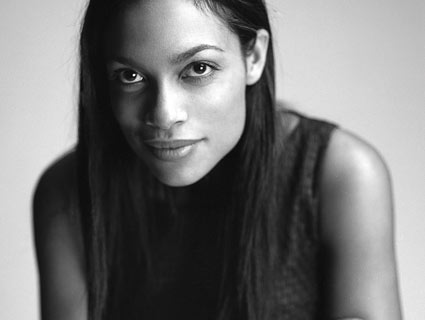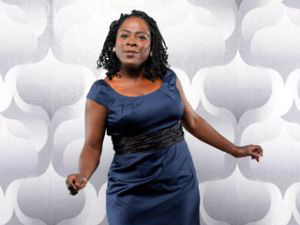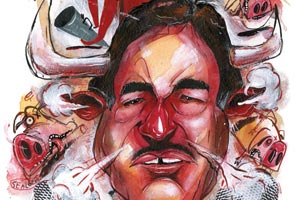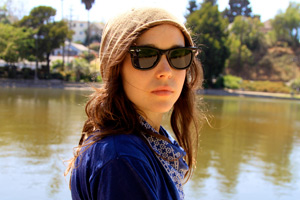
Jeff Riedel/Contour by Getty
Rosario Dawson never pined to be an actress. Her family, squatting in an abandoned tenement building in New York City, was just trying to make it. Then, when she was 15, the director of Kids spotted her on her front stoop, and her life has been a cascade of film roles, from Rent to Sin City, ever since. (You can see her in Zookeeper, a new comedy in theaters this week.) But the busy star hasn’t forgotten her hardscrabble roots. Dawson, now 32, remains outspoken on everything from violence against women, to voting rights, to the politics of the census. Naturally, the self-described “Twitterholic” was “best-dressed” at the White House correspondents’ dinner (so says that noted fashion arbiter Politico).
I caught up with Dawson as she was getting ready for a show by her friend Prince—and a visit with President Obama. She had so much to say about her various projects that we didn’t even get to her Star Trek yen (yes, she speaks Klingon) or the Paul Rudd crotch-grabbing incident last year when she defended a fondled Eva Mendes (and women everywhere). Suffice it to say, the lady’s got range.
Mother Jones: You’re in Girl Walks Into a Bar, the first straight-to-YouTube feature film. Is this where the industry is headed?
Rosario Dawson: Oh, hell yeah! With the recession, people are having to choose between their cable and their internet connection. And think about it. When they started making made-for-TV movies, people thought it was a fluke. Who would watch that? Because it’s in your TV screen and not in a theater. Remember that?
MJ: How is digital distribution changing the game for you as an actor?
RD: It’s a whole other way of communicating with your fans and giving them content at their leisure. It’s like, there are people making music in their igloos on their PDAs. You’re going to see the exact same thing with film. I’ve been in this industry for 16 years, and I feel very excited about it again. Back in the day, you’d walk down to a street corner and see some people making a story with a hat in front of them. It’s ancient entertainment, ancient storytelling and oral history—now we’re doing it on YouTube. We were all freaked out by the whole HD thing, that it would show every pore on a person’s face. Personally when I first saw it I said, wow, everything looks like porn! This is too real! But you get so desensitized, you just get used to it.
MJ: You were actually doing online productions before it was the current rage, producing and starring in online-only shows. Can you have more fun in this milieu since there are lower production costs, like can you experiment more?
RD: There wasn’t a whole lot of precedence before us. Maybe it wasn’t going to be a success, and they were going to spend this money and we weren’t going to be able to recoup it. We just put ourselves out there and it was fun, we were shooting in LA, with unions, and it just was great to just feel like, okay, we’re trying something else so let’s see what happens. You’re not spending an entire three days shooting half a page where everyone is sitting in their trailers for most of the time. I’ve just been very excited that over the years I’ve constantly had those types of different experiences. I like staying a little bit like acting school, not experimental, necessarily, but just fun. I have the best job in the world: I pretend for a living. You can’t get too precious about that.
MJ: You started Voto Latino in 2004 in the throes of the Bush Administration, where channeling outrage was pretty straightforward. Is the sell more complicated now?
RD: Yeah, but I think nuance is very important to have in the conversation, nuance that’s been lacking for a long time. A lot of voting organizations only exist every four years, putting all this money into “your voice is important!” Wouldn’t that be nice, if that’s all it took? Voting is the first political action for most people. But if you don’t follow up then voting is not actual participation but just a one-off. That person has no accountability or political cost to what they said they were going to do and what they ended up doing. This is the only free country in the world that’s doing lobbying. Voters should be the lobbyists. If we can spend all of this time with all these different celebrities who fill up the internet and magazines then we should be able to keep an eye on politicians because they might cost you your job and your home and your life savings. Don’t you want to know who they are? When people start to complain, “Voting doesn’t matter,” I’m like, the people of Wisconsin weren’t boycotting and hitting the streets and blowing up those rooms because voting didn’t change those situations for them. That was their livelihood. There’s revolution going on all over the world because they actually can’t have a voice.
MJ: You produced a series of telenovela spoofs for YouTube called La Pasion de la Decision that are essentially voting soap operas. Activism used to be so earnest. Has it lightened up a bit?
RD: The reason we do activism is because, maybe you haven’t been raped or abused, but there are millions of people who can’t say the same, and when you hear their stories you may be a little bit compelled. And it doesn’t have to be dark. In the Congo, there are women who’ve been raped and re-raped, and they’re so powerful, and they can carry trees on their heads, and they’re dancing!
MJ: What is it about Twitter that makes it a good mix for you as an actor and activist?
RD: I really like Twitter. It’s a conversation and it reminds me of having stranger conversations on the train. I’m a New Yorker. I’m used to bumping into strangers, acknowledging them, them acknowledging me, even if it’s just with an eyebrow lift. And maybe you just have those impromptu conversations, or where all of the sudden you’re standing on the corner waiting to cross the street and you notice three people looking up and you look up with them. And you all smile at each other because you’re seeing a little piece of a rainbow between two buildings, and that little [rainbow] and you all just shared a New York moment, and that’s awesome, and then you keep on in your way. (What’s odd about it is that I see it as these moments and then other people, I’ll reply to someone, and they’re like, “Follow me back, let’s be friends!” and I’m like, “See, on the train you have a great conversation between stops and you don’t necessarily exchange phone numbers. It’s not that deep, actually. Why can’t the moment just be what it is?”) I grew up and I’ve worked with people who have been very present, a) either always jumping to whatever is most modern technologically advanced sort of thing, or b) people in this industry, like Kevin Smith, who, his communication with his fans is hugely connected to his success. And he was talking about that years ago. And David Bowie was doing that years ago. And Prince was doing that years ago. There have been people who’ve understood it for a long time, who’ve gone, okay, this is a medium I get. It’s not a phase; it’s not a fad; it’s actually something quite vital and important, and it’s pretty fascinating to watch that.
For me it’s great because I am very political about stuff, and I do have a lot of issues that I care about. Twitter frees me up from being on the red carpet and feeling like I have all of these things to say, but it’s not the appropriate time to be talking about rape in the Congo. I’m in high heels, I’m wearing a fabulous dress, people want me to just smile and talk about my movie because I only have three minutes, and that’s my job. I do have people who are like, “Yo, I think someone hacked into your Twitter account to talk about census forms.” I’m like, “No, that’s me.” There are people who don’t like celebrities who tweet about politics—to whom I say, don’t follow me. Thank you for liking Sin City. I can completely understand if you watch that movie and then I talk about single-use plastic bags and you’re a little confused, maybe put off: “You should be talking about machine guns! In a sexy way!” I’m sorry, that’s not me.
MJ: Any hashtag you wish would take the Twitterverse by storm?
RD: I am the queen of hashtags! I love hashtags. I think in hashtags. I wish I could write everything in hashtag. Me and my friends, we do this little two-finger-on-two-finger thing when we talk to each other, because we’re Twitterholics. Maybe #acceptance. I feel like we pay a lot of attention to the word “tolerance,” and I don’t really like it. I get it, but I don’t need you to tolerate this. It is. When you accept something, it’s much deeper.
MJ: Why do you suppose that actors work so hard to remain apolitical?
RD: From Marilyn Monroe and beyond, that’s a huge part of Hollywood, creating a persona that’s mysterious and fairly simple, though it’s interesting how that’s changing: Now, you have fans who are like, “Um, yeah, I just emailed with Barack Obama and tweeted with Lady Gaga, so I’m kinda right there with you; give it to me.” I get that people are a little allergic to celebrities using their voices, but I grew up a squatter on the Lower East Side, so it’s kind of a given that I’d have very strong opinions on everything from cyclical violence to teenage pregnancy to environmental justice.
MJ: You don’t see mainstream films being made about poor people very often. Winter’s Bone, about life in the Missouri Ozarks, was made because it was backed by someone who was independently wealthy. It seems like the types of movies that are made could change if budgets are smaller, you can communicate wholly different messages to a worldwide audience.
RD: People watch more documentaries too now. These movies that would normally be shown in these little art houses, and unless you walked by the theater, or happened to read that tiny zine that contained the info for it, or went to a film festival, you might miss it. But now your average Joe can go: “I watched all the action movies on my playlist, now let me see what’s playing in documentaries, see if there’s anything I like there. I’ll watch this one on sports, and I’ll watch this other one, and then, all right, let me see this one on the private-prison system and the privatization of water and…holy shit!” It’s kind of amazing and in some ways it’s shocking to me how much information is out there and still how little we look at it to inform. Once upon a time if we saw whale murders were happening, people were hitting the streets and we had to stop them. And now The Cove wins awards, and no one’s doing anything about the dolphins. And then you see Inside Job, and you’re like, “Why aren’t people hitting the streets over this, what does it take?” You can watch a documentary at three o’clock in the afternoon and get really, really angry, and then just when you’re about to get up to call your congressman, a commercial comes on and you’re like, “Oh my God, I love that laughing baby, it’s so cute!” Wait a minute, no, this was a big thing you just saw, why don’t you get active about it? I don’t put all my eggs in any basket and go, now with social media we can just be social activists; no, we have to really choose to do take action. And it’s a long day, and you want to just play your video game. And believe me, I love playing Red Dead Redemption or Arkham Asylum, too. I get it; it’s not about always being so vigilant all the time. It’s about finding that balance.
MJ: When you were just 19, Prince invited you to do the intro commentary on his “1999” remix. He also called you the “voice of a generation.” You seem to have taken that to heart.
RD: He just saw me. Maybe more so than I saw myself at that time. I take it very seriously. And it’s not all like beautiful-smelling roses all the time. There’s room for improvement. And I’m young enough. My grandmother will vote, but she looks at some of the political stuff I do and says, “That’s a young person’s game.” But then there’s Dolores Huerta—she’s what, 80? And she’s saying, “I’m not tired, I’m still marching—what’s your excuse?”
















